

American Association for the Advancement of Science. Download: A Framework for K-12 Science Education: Practices, Crosscutting Concepts, and Core Ideas. A Framework for K-12 Science Education: Practices, Crosscutting Concepts, and Core Ideas. Radiation can be emitted or absorbed by matter.
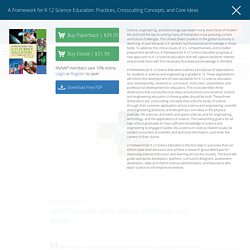
When matter absorbs light or infrared radiation, the energy of that radiation is transformed to thermal motion of particles in the matter, or, for shorter wavelengths (ultraviolet, X-ray), the radiation’s energy is absorbed within the atoms or molecules and may possibly ionize them by knocking out an electron. Uncontrolled systems always evolve toward more stable states—that is, toward more uniform energy distribution within the system or between the system and its environment (e.g., water flows downhill, objects that are hotter than their surrounding environment cool down). Any object or system that can degrade with no added energy is unstable. Eventually it will change or fall apart, although in some cases it may remain in the unstable state for a long time before decaying (e.g., long-lived radioactive isotopes). Grade-Level Endpoints for PS3.B By the end of grade 2. By the end of grade 5.
Light also transfers energy from place to place. MatrixOfCrosscuttingConcepts. NGSS Hub. Crosscutting concepts have application across all domains of science. As such, they are a way of linking the different domains of science. Matter and Energy for Growth and Activity, Student Edition. Benchmarks Online ~ Project 2061 ~ AAAS.
Performance Assessment of Competency Education (PACE) 2017-2018 PACE Student Performance Results Revised Consistent cut score setting methods were used in revised scores for year-to-year comparability New Hampshire has operated the Performance Assessment for Competency Education (PACE) as a federally approved pilot program since 2015 under a special waiver from the U.S.
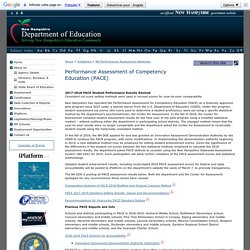
Department of Education (USED). Under this program, student assessment cut scores (the score used to determine a student proficiency) were set using a specific statistical method by the department’s psychometrician, the Center for Assessment. In the fall of 2018, the Center for Assessment compiled student assessment results for the final year of the pilot program using a modified statistical method – without notifying either the department or participating school districts. In the fall of 2018, the NH DOE applied for and was granted an Innovative Assessment Demonstration Authority by the USED to continue the PACE program, with some modifications. NH PACE Readiness Matrix. Knowledge Management 2.0 - Two Rivers Charter Schools.
How might we assess deeper learning competencies like effective reasoning, problem solving, and decision making?
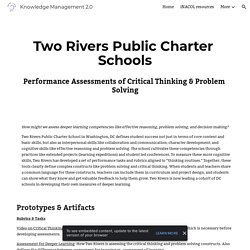
Two Rivers Public Charter School in Washington, DC defines student success not just in terms of core content and basic skills, but also as interpersonal skills like collaboration and communication; character development; and cognitive skills like effective reasoning and problem solving. The school cultivates these competencies through practices like extended projects (learning expeditions) and student led conferences. To measure these more cognitive skills, Two Rivers has developed a set of performance tasks and rubrics aligned to “thinking routines.” Together, these tools clearly define complex constructs like problem solving and critical thinking. When students and teachers share a common language for these constructs, teachers can include them in curriculum and project design, and students can show what they know and get valuable feedback to help them grow.
Quality Performance Assessment and Task Design. CCE - Center for Collaborative Education. The mission of the Center for Collaborative Education (CCE) is to transform schools to ensure that all students succeed.
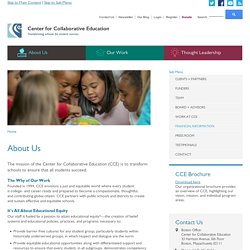
The Why of Our Work Founded in 1994, CCE envisions a just and equitable world where every student is college- and career-ready and prepared to become a compassionate, thoughtful, and contributing global citizen. CompetencyWorks Levers and Logic Models. CW An International Study in Competency Education Postcards from Abroad October 2014. CWSummit DesigningForEquity 29Mar2018.
New Hampshire High School Redesign. Beginning in 2013, The New Hampshire Department of Education invited educators to participate in the process of creating statewide college and career ready competencies.
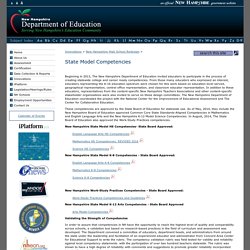
From those many educators who expressed an interest, educators representing the K-16 education spectrum were chosen for this work based on education level served, geographical representation, central office representation, and classroom educator representation. In addition to these educators, representatives from the content-specific New Hampshire Teachers Associations and other content-specific stakeholder organizations were also invited to serve on these design committees. Experience Matters: Why Competency-Based Education Will Not Replace Seat Time.
There is a growing trend in higher education to offer college credit for “prior learning” and demonstrated competence.
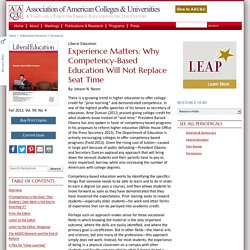
In one of the highest profile speeches of his tenure as secretary of education, Arne Duncan (2011) praised giving college credit for what students know instead of “seat time.” Great Schools Partnership. Selecting an Online Grading and Reporting System. Competency based learning State of the U.S. K 12 market. Sitka School District - Leveraging Collaboration & Flexible Schedules. CW An International Study in Competency Education Postcards from Abroad October 2014. CBE Topics Archive. Sitka School District - Leveraging Collaboration & Flexible Schedules. Going All In: How to Make Competency-Based Learning Work. Show What You Know: The Shift To Competency. Cbe versus traditional education. The Future Of Learning? Well, It's Personal : NPR.